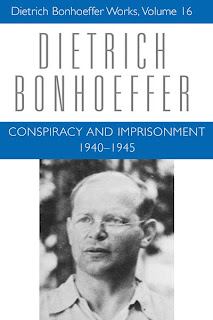Critical reviews (by Lutheran pastors and church musicians) of books and other resources for Christian worship, preaching, and church music from a perspective rooted in Holy Scripture, the Lutheran Confessions and good common sense. LHP Quarterly Book Review asks, "Is it worth the money to buy, the time to read, the shelf space to store, and the effort to teach?"
Thursday, June 17, 2010
LHP Review: Context for Bonhoeffer
Bonhoeffer, Dietrich. Conspiracy and Imprisonment 1940-1945 (Dietrich Bonhoeffer Works 16). Minneapolis: Fortress Press, 2006. 882 Pages. Hardback. $60.00. http://www.augsburgfortress.org/ (LHP)
Just over a year ago, I began service in a new call. This is one of the review books I brought with me from Morrill, Nebraska to Sheridan, Wyoming. In that time, there have been some changes in how we have done our work here at LHP QBR. We have transitioned to a blog. Some reviews have been delayed by pastoral care emergencies. We have expanded the number of reviewers. We have renewed our focus. In order to continue doing this to some extent and do justice to my vocations of Christian, Husband, Pastor, School Headmaster, and Worship Chairman for the LCMS Wyoming District (the reason for my service here as QBR editor) our reviews are hopefully more to the point. The shorter length also meshes well with the emerging practices of the blogosphere.
Bonhoeffer lived and served in a time of tumultuous change. The developments in my life are given better perspective with every new release in the Dietrich Bonhoeffer Works series. I can identify with Bonhoeffer in his vocations of Christan, man, pastor, and scholar. Do we always agree? No. Is that supposed to limit how much I can learn from him? Not in my mind.
"This volume, published in the year of the one hundredth anniversary of Bonhoeffer's birth, documents Bonhoeffer's life under the increasing restraints and fateful events of World War II Germany.
"In hundreds of letters, including ten never-before-published letters to his fiancée, Maria von Wedemeyer, as well as official documents, short original pieces, and a few final sermons, the volume sheds light on Bonhoeffer's active resistance to and increasing involvement in the conspiracy against the Hitler regime, his arrest, and his long imprisonment. Finally, Bonhoeffer's many exchanges with his family, fiancée, and closest friends, demonstrate the affection and solidarity that accompanied Bonhoeffer to his prison cell, concentration camp, and eventual death." (publisher's website).
Some DBW volumes provide new critical editions (in English translation) of his main published works. The latter volumes in the series provide the aforementioned sermons, notes, letters and other documents that provide the all-so-important context for his major works (187), news of the time (Mass Deportation of Jewish Citizens, 225ff), and the life decisions (being secular, 328ff; a letter for after a successful coup, 572ff) that led to his imprisonment and death. Perhaps that is why I take exception to the use of inclusive-language translation of historical documents (25). I do look forward to seeing Letters and Papers from Prison (DBW 8), Fiction from Tegel Prison (DBW 7), and Ethics (DBW6). The Appendix 1 map of Bonhoeffer's Germany was particularly helpful.
I wonder if the "martyr" question is even a helpful one. Did he really die as a direct result of his confession of Christ? No. That's my opinion. Was it unjust? Yes. Was Bonhoeffer persecuted as a Christian and as a pastor in Nazi Germany. No doubt.
I enjoy reading Bonhoeffer the theologian. When we writes in harmony with Scripture, he excels. "The resurrection of Jesus Christ is God's Yes to Christ and his work of expiation" (473). Might this be confusing to laypeople? Sure. I appreciate his insight, fresh language, and courage. He holds to both baptizing and teaching as God's means of making disciples in the face of those who would abolish infant baptism (571).
Critique Dietrich Bonhoeffer as you will (and perhaps should). He was willing to critique himself. And we can learn from him in that regard, too.
The Rev. Paul J Cain is Pastor of Immanuel Lutheran Church, Sheridan, Wyoming, Headmaster of Martin Luther Grammar School, Wyoming District Worship Chairman, and Editor of QBR.

